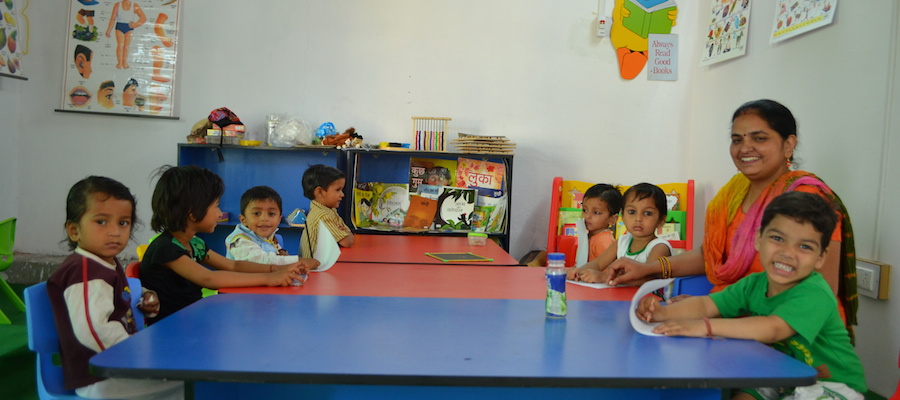
This blog post was written by Reema Ahuja, School In-Charge of the READ India Playschool.
More than 80% of brain growth occurs between birth and age six in a child. These early years form perhaps the most crucial period in a person’s life, when the rate of development is very high and foundations are laid for cumulative lifelong learning and human development. For the brain to develop optimally, a child needs a stimulating environment, social interaction, and adequate nutrients. The absence of these things can result in a child being less healthy and having a lower IQ, which makes it harder for them to do well in school and eventually to get jobs as adults.
READ Global’s model is based on providing holistic education for all people in South Asia – regardless of age. READ Centers all feature children’s sections with resources for young learners, so they get the chance they deserve at a good life.
READ India saw the need for these services in Shahbad Mohammadpur, a low-income, underserved community just a few kilometers from the Indira Gandhi International Airport in the capital of Delhi. People in this “urban village” have surprisingly scarce access to quality educational resources and economic opportunities. Literacy rates are low, and poverty rates high.
Nearly two years ago, READ established a Center in Shahbad to reduce this educational gap. This year, we launched a fully-fledged organized preschool in the same building to improve the quality of services provided to young children in the community.
We visited existing preschools in Shahbad before we launched our own, and were surprised by what we found: practices in other schools were rarely child-friendly or developmentally appropriate.
Outdated, conventional teaching methods were still being used. Toddlers were in a structured, formal classroom where they sat at wooden desks and learned rote lessons with a blackboard as the only learning aid. Play, innocence, and fun were not a part of education. And parents didn’t understand their children’s experience, because parent-teacher meetings didn’t exist, and they were often not allowed or encouraged to enter the premises of the school.
We at READ resolved to open a preschool where children love to come and learn through play, and the focus of lessons is not only on basic reading, writing and arithmetic, but also on the overall development of the children.
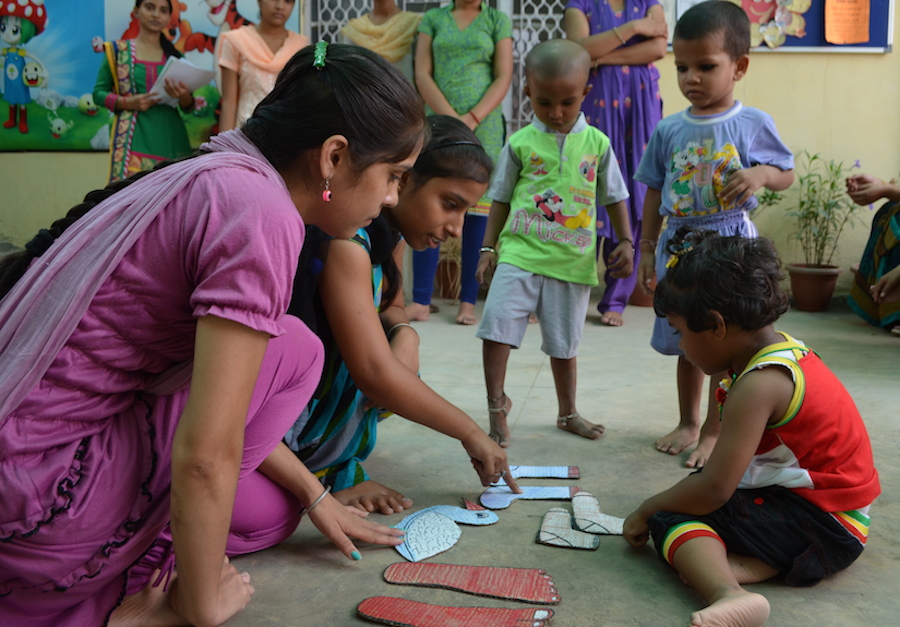
The READ India Playschool includes a focus on physical motor skills, as well as socio-emotional, cognitive and language development.
A day at the school starts with aerobics, yoga, dance, singing in Hindi, and English rhymes with actions. Next, play-based groups teach new core concepts like early literacy and numeracy. After lunch is creative time, with arts and crafts like clay modeling, theatre and role-play, drawing, and more. Finally, the children come together for storytelling. Because every child is unique, as a preschool we try to accept and respect these differences. Knowing every child’s habits, behavior, and progress is very important for teachers to make classroom a personal space.
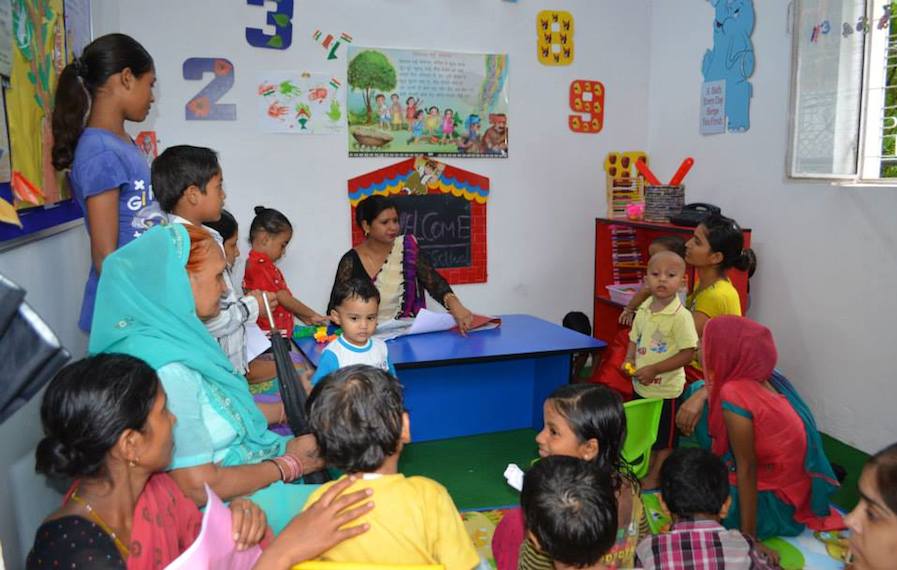
Parents are encouraged to come and sit in classrooms when lessons are on, and we have frequent parent-teacher meetings. This helps the children acclimatize, and teaches parents new educational and developmental techniques that they can use at home.
Early childhood education also empowers mothers: when children are in a safe space with caregivers, mothers have the opportunity and time to learn new skills at the READ Center and take up jobs to support their families.
Mothers in Shahbad can leave their children at daycare, and then learn other skills at the Center through adult resources and training programs: from literacy and computer skills, to health or income-generating activities like sewing.
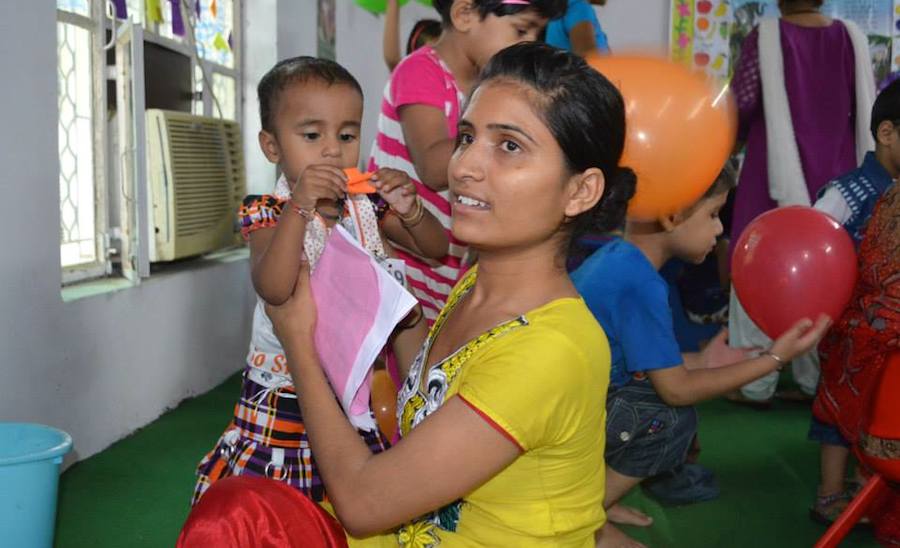
When we first launched the playschool, the community did not quite understand the value of early childhood education because it was outside of the social norm.
Parents thought that their children were too young to attend school: that they only needed to encourage play at home, which can happen with the help of extended family.
We are proud to say that since opening the READ India Playschool in April, we now have 33 children enrolled, and more families come each day to learn about what makes the school unique, after hearing about us from their neighbors.
Parents have formed a strong network with teachers, and reported positive changes in their children’s language, behavioral habits, academic skill development, interaction with peers, and personality.
What is fascinating is that the children themselves are the biggest advocates of the school, and by extension, of social change in their communities. They go home each night and repeat the rhymes they learned that day, share what they learned, and tell their parents and siblings how much they love going to school.
Share this blog post with your family and friends!
![]()
![]()
![]()
About the author:
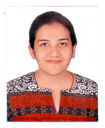
Reema Ahuja, School In-Charge, READ India Play School
Reema joined READ India team in April 2014. She is responsible for planning, setting up, and managing the READ India Playschool. She also develops training modules and guidelines for managing children’s sections of READ Centers, and leads trainings of master trainers in Early Childhood Care and Education across READ Centers. Reema holds a postgraduate degree (M.Sc.) in Human Development and Childhood Studies from Delhi University, and received the Smt. Satyawati Sharma Gold Medal (Delhi University) in 2012. Before joining READ, she worked as an Assistant Professor in the Department of Human Development and Childhood Studies at Delhi University. Her main interest lies in using innovative approaches for engaging young children.



